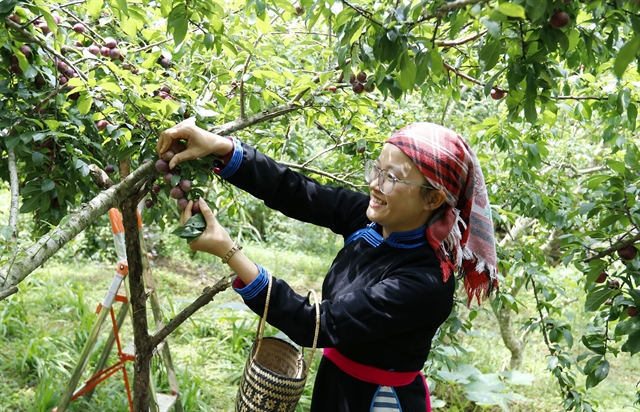 Society
Society

 |
| A farmer harvests fruits in Lào Cai northern mountainous province. — VNA/VNS Photo Quốc Khánh |
LÀO CAI — Over several years, support policies of the Party and State for ethnic groups and mountainous areas have been effective, helping Lào Cai Province gradually improve the spiritual and material lives of local people.
The policies have helped promote socio-economic development, reduce poverty and ensure social security in the locality.
Lý Khánh Lâm, head of the Bát Xát District's Division of Agriculture, said that more than six hectares of passion fruit trees planted in Phìn Ngan Village, Trịnh Tường Commune, were now producing their first harvests with prices of VNĐ30,000-40,000 (US$1.17-1.57) per kilo.
Trịnh Tường Commune is a particularly poor place in the district, the people’s life and income have long depended mainly on growing rice and corn, so there remained many difficulties.
When the commune benefitted from the National Target Programme 1719, including capital to support production, the division studied which could be the most valuable seedlings to put into cultivation and which would gradually push up farmers' income. Passion fruits were selected for trial planting and farmers were given seeds, fertilisers and trellis wires.
“Now, the passion fruit price is good and as soon as the fruit is harvested, traders will come to farming gardens to buy it, so farmers are very excited," said Lâm.
The initial results were so effective, but in the first few days of calling on people to participate in the project, there were many difficulties.
Secretary of the Phìn Ngan Village Party Committee Lò Láo Tả said that the villagers had long been familiar with corn and rice, so when they had heard about growing passion fruit, they were distrustful at first.
To gain their trust and participation, the village’s Party Committee had to take the lead in planting a hundred trees.
Then, by persistently convincing them they could grow alternative crops, the villagers little by little accepted.
“Currently, 15 households grow passion fruits and many others are registering to plant the fruit on their family's land," said Tả.
Another example is Nậm Cọ Village, Khánh Yên Thượng Commune, Văn Bàn District, which has turned to growing cinnamon trees.
The cinnamon growing area in the village is increasingly expanding, bettering the people’s lives.
Previously, the road to the village was full of obstacles, limiting travel and trade, affecting the locals’ income and life.
When the 1.5km long road to the village was built, with a VNĐ2 billion ($78,600) investment from the National Target Programme 1719, it opened up new opportunities for people.
Chairman of the Khánh Yên Thượng Commune People's Committee Nguyễn Văn Hạnh said: "In the early days of calling for the people to donate land to open the road, we faced lots of problems. Many locations along the road were people's production forests, so they did not agree with the plans. Then we analysed the common benefits, so they understood and worked with the local authorities to build the road".
Clean water
Previously, water for Thào A Hờ's family in Phìn Chải 1 Village, A Lù Commune, was mainly brought from the mountain ravine.
Therefore, the water source was unstable and there were times with no water, which significantly affected his family's daily life.
Last year, Hờ's family was supported with a stainless steel water tank and auxiliary equipment, helping them feel much more secure because they had clean water for daily use.
Knowing that they have a protected source of water, they have felt reassured.
Lồ A Sính, secretary of the A Lù Commune Party Committee, said that in the past, people mainly used cement tanks, jars, and pots to store water.
The water containers did not have lids and were rarely cleaned, so many types of larvae often appeared, posing a risk of disease.
Hundreds of households have been supported with water tanks under the National Target Programme 1719.
According to the projected plan between 2021-2025, Bát Xát District will provide 1,504 water tanks to households. So far, the district has provided 1,926 tanks, exceeding that number already by 422.
After four years of implementing the National Target Programme on Socio-Economic Development for Ethnic Groups and Mountainous Areas for the 2021-25 period in Lào Cai Province, by last year, 119 households received housing investment and 26 public water supply works were built for 3,560 households.
As many as 163 households were helped to purchase machinery and agricultural tools for production.
The programme also supported 4,883 water tanks and 4,825m of water pipes for 4,883 households in the province.
The programme's effective implementation has helped stabilise the lives of ethnic people in the area, creating a solid foundation for them to develop the local economy, improve their quality of life and reduce the levels of poverty. — VNS




